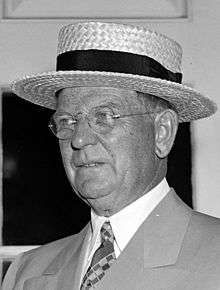Edward Joseph Kelly
| Edward Joseph Kelly | |
|---|---|
 Mayor Kelly in 1937. | |
| 36th Mayor of Chicago | |
|
In office April 17, 1933 – April 15, 1947[1] | |
| Preceded by | Frank J. Corr |
| Succeeded by | Martin H. Kennelly |
| Personal details | |
| Born |
Edward Joseph Kelly May 1, 1876 Chicago, Illinois, United States. |
| Died |
October 20, 1950 (aged 74) Chicago, Illinois, U.S. |
| Resting place | Calvary Cemetery (Evanston, Illinois). |
| Political party | Democratic |
| Spouse(s) |
Mary E. Roche (m. 1910; div. 1918) Margaret E. Kirk (m. 1922–1950) |
| Children | 4 |
| Residence | Chicago, Illinois |
Edward Joseph Kelly (May 1, 1876 – October 20, 1950) was an American politician who served as the 36th Mayor of Chicago from April 17, 1933 until April 15, 1947.
Prior to being mayor of Chicago, Kelly served as chief engineer of the Chicago Sanitary District during the 1920s.
Kelly was a Democrat.
Biography
Born to Stephen, a police officer and Helen (née Lang) Kelly, he was the first of five Chicago mayors from Bridgeport of Chicago's South Side.[2]
Kelly was the chief engineer of the Chicago Sanitary District in the 1920s. He was sponsored by Patrick Nash, the owner of a sewer-contracting company that did millions of dollars of business with the city.[3]
He subsequently became president of the South Park Board, a position that presided over the building of Soldier Field. Under his tenure Soldier Field cost $8 million, while a similar Los Angeles stadium only cost $1.7 million.[3]
Mayor of Chicago (1933–1947)
Following the assassination of Mayor Anton Cermak, Kelly was hand-picked by his friend, Patrick Nash, Chairman of the Cook County Democratic Party, for the mayoral election of 1933.[4] Together, Kelly and Nash built one of the most powerful, and most corrupt, big city political organizations, called the "Kelly-Nash Machine".
Kelly was Mayor of Chicago during the 1933–34 Chicago World's Fair (Century of Progress) which took place during the Great Depression which included the successful playing of the first official Major League Baseball All-Star Game; Kelly initiated for holding a major sport event for the fair to the Chicago Tribune. Kelly was famous for banning Nelson Algren's 1942 book Never Come Morning, a novel, from the Chicago Public Library; the ban remained in force for decades due to the outcry by Chicago Polonia upon its release.
End of Tenure
In April 1947, Kelly acquiesced to the Cook County Democratic Party's decision to slate a candidate with reform credentials for mayor of Chicago and was succeeded by Martin H. Kennelly.[5]
Death
Kelly died in 1950 at age 74 and was interred in Calvary Cemetery in Evanston, Illinois.[6]
See also
- Timeline of Chicago, 1930s-1940s
- The Current Mayor of Chicago.
References
- ↑ NNDB – Edward J. Kelly
- ↑ "Political History of Bridgeport". University of Illinois - Chicago. Retrieved September 1, 2007.
- 1 2 "History of Chicago from Trading Post to Metropolis (Module 3 Chapter 2-Chicago During the Great Depression)". Roosevelt University. 2006. Archived from the original on September 27, 2007. Retrieved 2007-08-29.
- ↑ "Edward J. Kelly Elected as New Mayor of Chicago – Takes Oath of Office After Action by City Council". Chicago Tribune. April 14, 1933. p. 38. Archived from the original on March 3, 2015. Retrieved March 3, 2015.
- ↑ Pacyyga, Dominic, Chicago: A Biography, 2009, Chicago, University of Chicago Press, 324 ISBN 0-226-64431-6
- ↑ "Edward Joseph Kelly". findagrave.com. Retrieved May 3, 2018.
| Political offices | ||
|---|---|---|
| Preceded by Frank J. Corr |
Mayor of Chicago 1933–1947 |
Succeeded by Martin H. Kennelly |